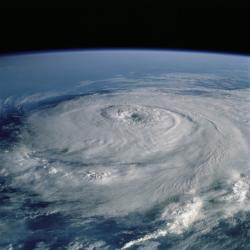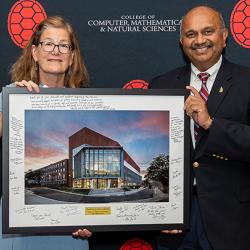Four Faculty Members in UMD's College of Computer, Mathematical, and Natural Sciences Named 2020 AAAS Fellows
The national honor recognizes their distinguished efforts to advance science
Four faculty members in the University of Maryland’s College of Computer, Mathematical, and Natural Sciences have been named 2020 Fellows of the American Association for the Advancement of Science (AAAS): Charles Delwiche, George Helz, William Lau and William Regli.
AAAS is the world’s largest general scientific society, and election as an AAAS Fellow is an honor bestowed upon AAAS members by their peers because of their scientifically or socially distinguished efforts to advance science or its applications.
New Fellows were formally announced in the AAAS News & Notes section of Science on November 24, 2020. A virtual induction ceremony for the 489 newly elected Fellows will take place following the 2021 AAAS annual meeting in February.
The four scientists, who hail from departments across the college, have advanced their fields of study in numerous ways.
Charles Delwiche
Charles Delwiche is a professor in UMD’s Department of Cell Biology and Molecular Genetics. He is being recognized for his “distinguished contributions to molecular systematics, particularly algal evolution and biodiversity.”
Delwiche uses molecular systematics and genomics to study early plant evolution. His research has broad implications across multiple scientific disciplines where algae provide insights into fundamental biological processes. Algae are major players in global carbon cycling, which is important for climate change; nutrient transport through marine food webs, which supports global fisheries; and outbreaks of harmful algae that can have tremendous impacts on human health and economics. In addition, his efforts to understand how microbial crusts evolved into the complicated terrestrial plant forms that dominate Earth’s landscapes today shed light on the emergence of modern ecosystems
“I am tremendously honored to receive this recognition,” Delwiche said. “This honor reflects the realization that there is tremendous diversity in algae and the central role these organisms play in many of the world’s major crises.”
The broad impact of Delwiche’s work is evident in the diversity of organizations and institutions he contributes to. Delwiche is a research associate in the Smithsonian Institution’s National Museum of Natural History Department of Paleontology. He served as the treasurer of the Phycological Society of America and sat on review panels for the National Science Foundation’s Assembling the Tree of Life program and the Dimensions of Biodiversity campaign. Delwiche also served on NASA’s exobiology review panel and Mars exploration payload assessment group and chaired NASA’s exobiology early evolution of life review panel.
Delwiche came to UMD in 1996. He is the supervisor of the Department of Cell Biology and Molecular Genetics’ imaging facilities and former director of the Biological Sciences Graduate Program.
Delwiche earned his bachelor’s degree in botany from the University of California, Berkeley, in 1984 and his Ph.D. in botany from the University of Wisconsin-Madison in 1990
George Helz
George Helz is a professor emeritus in UMD’s Department of Chemistry and Biochemistry and Department of Geology. He is being recognized for “outstanding research, leadership, innovation, teaching and service to the community in aqueous and environmental geochemistry.”
His early research focused on water disinfection chemistry, trace metal chemistry in sulfidic waters and Chesapeake Bay geochemistry. More recently, he has worked on geochemical indicators that characterize ancient environments with the goal of improving the scientific understanding of the evolution of life.
“It is very nice to think that someone out there has appreciated my work,” Helz said of being named an AAAS Fellow. “Although long-retired, I continue to pursue and publish research, and perhaps this award will inspire others to continue with theirs.”
Helz joined the Department of Chemistry and Biochemistry in 1970, rose through the ranks and retired from the department in 2005. Among the many positions he held during his tenure, Helz was the director of the Maryland Water Resources Research Center from 1990 to 2001. He served as the chair of the American Chemical Society’s Division of Geochemistry and the president of the Geological Society of Washington. He was a member of the Chesapeake Research Consortium’s board of trustees and he served on the National Science Foundation steering committee for a workshop to design an environmental biogeochemistry program.
In 2004, Helz was awarded “rainmaker” status by the UMD Vice President for Research for securing major contract and grant support.
Helz earned his bachelor’s degree in geology and chemistry from Princeton University in 1964 and his Ph.D. in geochemistry from Pennsylvania State University in 1971.
William Lau
William Lau is a research scientist in UMD’s Earth System Science Interdisciplinary Center (ESSIC), a visiting research scientist and lecturer in UMD’s Department of Atmospheric and Oceanic Science and emeritus director of Atmosphere, Earth Science Division at NASA’s Goddard Space Flight Center. He is being recognized for “profound contributions to the understanding of atmospheric low-frequency oscillations, monsoon dynamics, aerosol-monsoon interaction and hydroclimate variability and change through original data analysis and modeling.”
Lau’s work focuses on climate feedback processes among atmospheric radiation, precipitation, convection and circulation as well as aerosol-monsoon interactions. These processes influence climate variability and change. Lau’s research has broken new ground in understanding how the physical processes on land, in the atmosphere and in the ocean are linked and the impacts of those linked processes on weather and climate extremes.
“This was a big surprise, and I have much appreciation for those who nominated and selected me,” Lau said on being named an AAAS Fellow
Lau joined UMD in 2016 as a research scientist in ESSIC. While at NASA, Lau served as the head of the Climate and Radiation Branch, chief of the Atmosphere Laboratory and the deputy director for science in the Earth Sciences Division.
He authored more than 270 refereed journal articles and is the senior author of a popular reference book published by Praxis Springer titled “Intraseasonal Variability in the Atmosphere-Ocean Climate System.”
The many professional awards Lau has received include NASA’s John C. Lindsay Memorial Award in 1987, the American Meteorological Society’s Clarence Leroy Meisinger Award for early career scientists in 1988, the NASA Exceptional Achievement Medal in 1991 and the William Nordberg Memorial Award for Earth Science in 1999. He is a Goddard Senior Fellow and a Fellow of the American Meteorological Society and the American Geophysical Union. He also served as president of the American Geophysical Union Atmospheric Sciences Section from 2015 to 2016.
Lau earned bachelor’s degrees in mathematics and physics in 1972 and applied mathematics in 1973 from the University of Hong Kong. He earned a master’s degree in physics and a Ph.D. in atmospheric sciences in 1977 from the University of Washington, Seattle.
William Regli
William Regli is a professor in UMD’s Department of Computer Science and director of the Applied Research Laboratory for Intelligence and Security (ARLIS). He is being recognized for “his work at the interface between science and government, primarily at the Defense Advanced Research Projects Agency (DARPA).
Regli is a computer scientist who works on issues that span the fields of engineering, artificial intelligence, and computational modeling and graphics. While at DARPA, he helped integrate computing, data science and artificial intelligence into the agency’s broader science and engineering portfolios.
“I feel both honored and delighted to know that my efforts during my time in government service helped advance the role of computer sciences across many disciplines,” Regli said of being named an AAAS Fellow. “Among my first memories as a child were those of watching Apollo 16 and 17 astronauts on the moon, and I always wanted to be a scientist and work on problems that matter.”
Regli joined UMD in January 2018 as a computer science professor and director of the Institute for Systems Research in the Clark School of Engineering. In December 2018, Regli was selected to lead ARLIS, which is chartered by the U.S. Department of Defense and operated by UMD.
Prior to arriving at UMD, Regli was a faculty member at Drexel University from 1997 to 2018. Regli served on the leadership team at DARPA from 2014 to 2017 and was named acting director of DARPA’s Defense Sciences Office in 2017. While there, he initiated programs in areas ranging from artificial intelligence and design and manufacturing to social science, applied mathematics, physical sciences and advanced sensing technologies.
Regli received the DARPA Meritorious Public Service Medal in 2018 for his contributions to the agency.
Regli serves as a scientific adviser to the U.S. Department of Energy's National Nuclear Security Administration and is a member of the U.S. Air Force Scientific Advisory Board. His research spawned two start-up technology companies—one focused on mobile communications for public safety and the other on information management in edge networks—and resulted in five foundational U.S. patents in the area of 3D computer-aided design search.
Regli is an elected senior member of the Association for Computing Machinery and the Association for the Advancement of Artificial Intelligence. He is also a Fellow of the IEEE Computer Society.
He earned a bachelor’s degree in mathematics from Saint Joseph’s University in 1989 and an M.S. and Ph.D. in computer science from UMD in 1994 and 1995, respectively.
###
Writer: Kimbra Cutlip
Media Relations Contact: Abby Robinson, 301-405-5845, abbyr@umd.edu
University of Maryland
College of Computer, Mathematical, and Natural Sciences
2300 Symons Hall
College Park, Md. 20742
www.cmns.umd.edu
@UMDscience
About the College of Computer, Mathematical, and Natural Sciences
The College of Computer, Mathematical, and Natural Sciences at the University of Maryland educates more than 9,000 future scientific leaders in its undergraduate and graduate programs each year. The college's 10 departments and more than a dozen interdisciplinary research centers foster scientific discovery with annual sponsored research funding exceeding $200 million.











